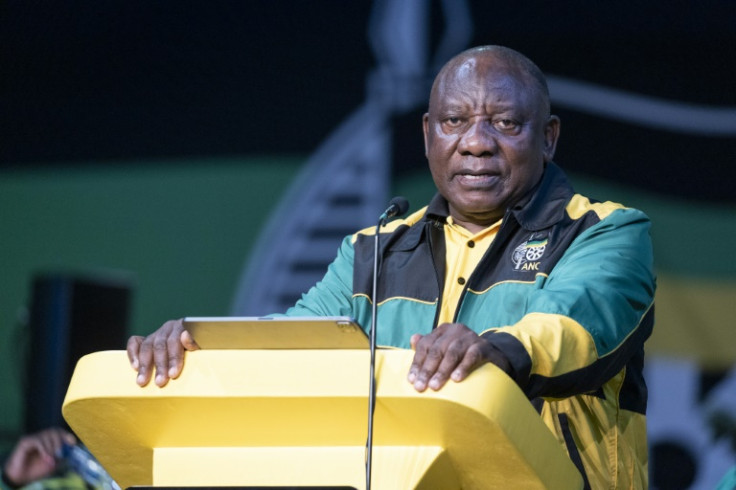Ahead Of Polls, ANC And Ramaphosa Try To Clean The Augean Stable

In 1990, the African National Congress (ANC) made an ideological somersault to embrace neoliberalism. In 2023, Africa's oldest liberation movement is intent on turning itself around as voter disillusionment against the ruling South African party looms large ahead of the polls in 2024.
In 1994, the ANC was sitting pretty with over 62 percent vote share. When polls were held in 2019 the party's support was dwarfed by 57.5 percent and was forced to live with its worst-ever electoral performance since it came into power in 1994.
Its decline in electoral support is attributed, among other things, to rising levels of poverty, failure to provide basic services and lack of economic growth.
The party's image has been dented by wide-ranging corruption allegations against its leaders, including party president Cyril Ramaphosa, who will be the ANC's presidential candidate in the upcoming elections.
The grand old party no longer enjoys political control in major cities of the country, including Johannesburg, Tshwane, which includes the capital Pretoria; and Nelson Mandela Bay, named after party icon Nelson Mandela.
The ANC is facing a tough national election in 2024, where pollsters predict it will struggle to get more than 50 percent of the vote share.
Because of the ongoing electricity crisis in the most advanced industrialized nation in Africa, households and businesses are learning to stay put with power blackouts for more than eight hours per day.
A turnaround has become a must after its image is battered by rampant corruption and mismanagement.
"The renewable process is irreversible, it is irrevocable," Cyril Ramaphosa, who succeeded Jacob Zuma in early 2018, said in the central city of Mangaung, where the party was founded 111 years ago.
"We do not pursue the path of renewal for its own sake, but we do so that we can drive our energies to solving the pressing problems facing the people of South Africa," Ramaphosa, who was re-elected as the ANC party leader in December last year, told party members.
To suit the party's renewal agenda, the ANC painted the streets of Mangaung green, black and gold and held a fundraising gala dinner and golf day, mini rallies, and arranged visits to the grave sites of former ANC leaders.
At the vital summit, 70-year-old Ramaphosa pledged to create more jobs for the youth in the country, where the unemployment rate is now over 46 percent. He even hinted at fixing the tardy state of the nation's economy, Africa's second-largest, which is again expected to face a difficult year. According to the International Monetary Fund (IMF), GDP growth is expected to rise by just 2.1 percent this year.
His plan is to invite direct foreign investment (FDI) by making the country conducive to a large influx of western capital to help post higher growth rates, higher employment and the trickle-down effect to alleviate poverty.
To achieve this, Ramaphosa may opt for more deregulation, privatization, and fiscal austerity.
To tame graft, Ramaphosa, who himself is hit by the "farmgate" scandal, involving somewhere between $580,000 and $5 million of foreign currency hidden at his private game farm, is planning to enforce a rule which will force tainted officials to give up their government and party posts.
Though Ramaphosa avoided impeachment, he still remains accused of holding undeclared foreign currency, tax evasion, and misusing state resources.
He has a poor track record in punishing the corrupt party members though tougher procurement rules and better oversight of state-owned firms have been planned, he was not able to punish many who were involved in high-level graft under Zuma and face several corruption investigations.
Other priorities of Ramaphosa, one of South Africa's wealthiest businessmen, as part of restricting the party included cutting red tape for business, tackling racism and more funds for black-owned businesses.
When he took over the reins of the party after being elected its leader in 2017, the anti-apartheid champion had vowed to wipe out corruption and fix the economy. But as he is getting ready for a second stint as president of a 60.6 million country, Ramaphosa still faces the same old problems.
Reforms initiated to secure energy security, jobs and the green energy transition have not yielded rich dividends due to internal party divisions.
Besides, his efforts will be frustrated by power shortages, the pandemic and declining support for the party, which dropped below 50 percent in civic polls in 2021.
Prior to the ideological shifts to embrace market fundamentalism in 1990, the ANC explicitly stood for a comprehensive redistribution policy and mooted a wealth tax.
After 28 years in power, the party shaped by Nelson Mandela is facing an existential crisis.
It is, however, doubtful whether the ANC and Ramaphosa are in a position to stage a turnaround, given the dangerous levels of corruption, state capture, inequality, poverty, and inefficiency in the country.
© Copyright 2026 IBTimes IT. All rights reserved.




















